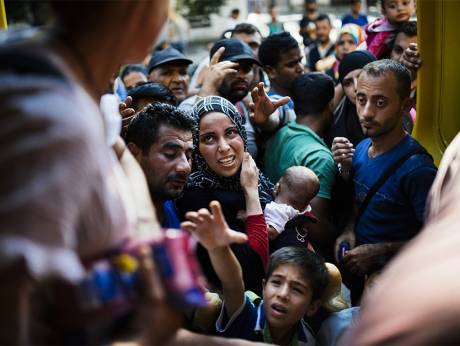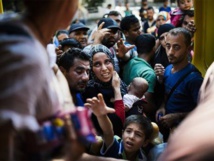The temporary ban at Traiskirchen camp came into force at midnight (2200 GMT), officials said. It was not immediately clear when it would be lifted.
Built to house 1,800 people, the camp is currently home to 4,000 men, women and children, with many forced to sleep in the open.
"The situation in Traiskirchen is no longer tolerable for the asylum-seekers," said Interior Minister Johanna Mikl-Leitner.
Health checks and initial administrative steps for people arriving at the camp 20 kilometres (12 miles) south of Vienna would still be carried out, but they would not be able to stay, her office said.
The regional governor announced the move last week over the dire sanitary conditions at the camp and the potential risk of epidemics.
During a recent visit, Christopher Pinter, representative of the UN refugee agency (UNHCR), described the situation as "intolerable, dangerous and inhumane".
Amnesty International is to inspect Traiskirchen on Thursday to "gain a clearer image of what's going on", a spokeswoman for the rights group told AFP.
The European Union is struggling to cope with a huge influx of refugees, many risking their lives to flee violence in Syria, Iraq and Afghanistan.
Almost 185,000 applied for asylum in the first quarter alone -- a rise of 86 percent according to EU statistics agency Eurostat.
In May, the European Commission proposed more evenly redistributing asylum-seekers across the 28-member bloc to help countries on the frontline like Italy and Greece, but many rejected the plan, among them Hungary, France, Spain and the Czech Republic.
In Austria the number of requests rose above 28,300 between January and June alone -- as many as the whole of 2014 -- and officials expect the total to reach 80,000 this year.
Most arrive from neighbouring Hungary, which, like Austria, is a member of the EU and the passport-free Schengen zone.
Hungary is building a fence along its border with Serbia, where most of the migrants cross from.
The centrist Austrian government has created emergency shelters in police stations and turned storage containers into temporary accommodation.
But Mikl-Leitner warned that this was only a short-term solution and accused the individual states -- responsible for taking in refugees while their applications are being processed -- of dragging their feet in providing extra housing.
------------------------------------------------------------------------------------------------------------------------
Built to house 1,800 people, the camp is currently home to 4,000 men, women and children, with many forced to sleep in the open.
"The situation in Traiskirchen is no longer tolerable for the asylum-seekers," said Interior Minister Johanna Mikl-Leitner.
Health checks and initial administrative steps for people arriving at the camp 20 kilometres (12 miles) south of Vienna would still be carried out, but they would not be able to stay, her office said.
The regional governor announced the move last week over the dire sanitary conditions at the camp and the potential risk of epidemics.
During a recent visit, Christopher Pinter, representative of the UN refugee agency (UNHCR), described the situation as "intolerable, dangerous and inhumane".
Amnesty International is to inspect Traiskirchen on Thursday to "gain a clearer image of what's going on", a spokeswoman for the rights group told AFP.
The European Union is struggling to cope with a huge influx of refugees, many risking their lives to flee violence in Syria, Iraq and Afghanistan.
Almost 185,000 applied for asylum in the first quarter alone -- a rise of 86 percent according to EU statistics agency Eurostat.
In May, the European Commission proposed more evenly redistributing asylum-seekers across the 28-member bloc to help countries on the frontline like Italy and Greece, but many rejected the plan, among them Hungary, France, Spain and the Czech Republic.
In Austria the number of requests rose above 28,300 between January and June alone -- as many as the whole of 2014 -- and officials expect the total to reach 80,000 this year.
Most arrive from neighbouring Hungary, which, like Austria, is a member of the EU and the passport-free Schengen zone.
Hungary is building a fence along its border with Serbia, where most of the migrants cross from.
The centrist Austrian government has created emergency shelters in police stations and turned storage containers into temporary accommodation.
But Mikl-Leitner warned that this was only a short-term solution and accused the individual states -- responsible for taking in refugees while their applications are being processed -- of dragging their feet in providing extra housing.
------------------------------------------------------------------------------------------------------------------------









 Home
Home Politics
Politics











